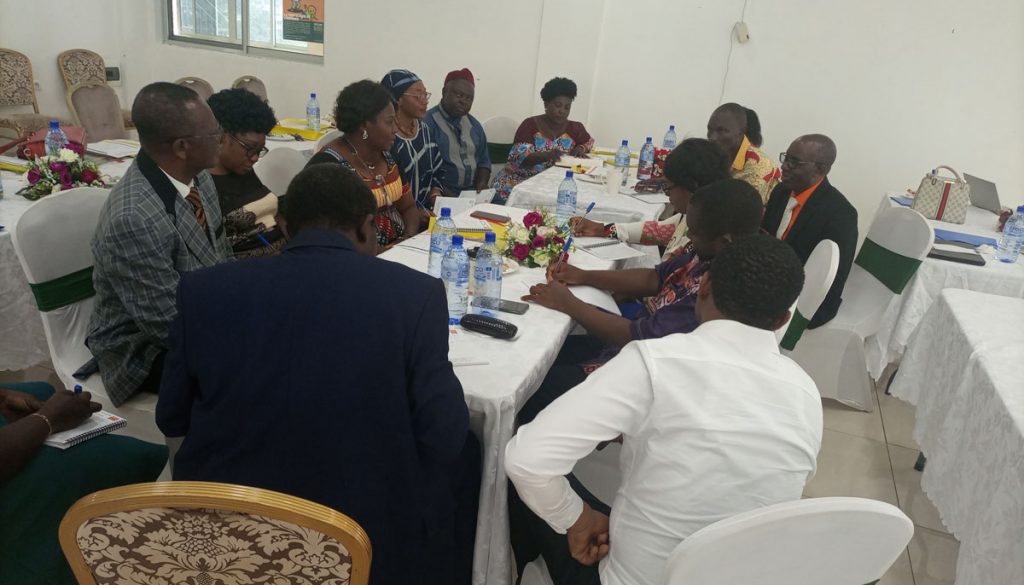Enhancing Successful Inclusive Education in Cameroon: CBC Health Services shares Research Findings with Stakeholders
The CBC health Services has in a one-day on February 17, 2022 at the CBC Health Services Resource Center at Mvan, Yaoundé, shared preliminary findings of a research on inclusive education conducted across schools in the Northwest and Centre regions under the project, “Breaking Down Barriers for Successful Inclusive Education in Cameroon”.
The research on disabilities, conducted in collaboration with the academia from the University of Bamenda marks the 6th research in a series, which the CBC Health services has been partnering with the Liliane Foundation and Universities in the Netherlands.
Participants at learning event
The workshop brought together the academia, regional delegates from the Northwest, West and Centre regions, representatives from the Ministry of Social Affairs, Basic Education, Public Health, CBM, Sightsavers and representatives of the Country Director of UNICEF. Prof. Tih Pius Muffih led the team from the CBC Health Services to share preliminary findings on pre-shooling for effective inclusion of learners with disabilities in mainstream education as well as learning from successful school leaders in inclusive education.
According to findings from the research; the CBC Health Services was found as one of the key leaders in the implementation of Inclusive Education in Cameroon. A respondent attested that “As for the country I don’t know, but I know that the CBC is doing quite a lot to help learners with disabilities in their education.” This has been made possible through the provision of braille and sign language support to learners with impairment in mainstream school; provision of resource room with didactic materials and assistive devices as well as facilitating structural modifications.
For the second research, a key finding was that home pre-schooling for children with disabilities is a very important strategy to facilitate inclusion in mainstream schools. This is because children with disabilities are able to learn skills like sign language, braille and other social interaction skills which enable them to cope when admitted in Mainstream school. The key recommendation from these findings is that home pre-schooling should be made a policy and mandatory for all children with disabilities, that CBR field workers be trained and equipped to provide home schooling to children with disabilities identified within their zones of coverage.
The Director of the CBC Health Services, Prof Tih Pius Muffih, told reporters that the result of the findings is intended to encourage key disability stakeholders present to take actions to foster inclusion and there after go into implementation. According to him, research should not only be for schools and for the academic world. He said conscious efforts need to be made to conduct research and improve the services that are offered for people with disabilities in the community.
Prof Tih Pius highlighted that partnering with the government of Cameroon through MINAS and MINEDUB, has enabled the CBC Health Services to do more for thousands of children, youths and adults with disabilities in 9 of the 10 regions of Cameroon.
The Director of Social Protection of Persons with Disabilities at MINAS, Angelica Bih Mundi asserted that considerable efforts is being made with the CBC Health Services to improve the situation of Persons with disabilities in Cameroon. Mme Angelica, however expressed worries that 69 inclusive schools aren’t sufficient for a population of 15% of persons with disabilities in Cameroon.
The research proposed the following recommendations: that government subsidies for free IE of children with disabilities should be extended to cover both public, confessional and lay private schools so that IE is free in every sector. Also, Common Entrance, FSLC and GCE/BAC Boards should get IE teachers to correct the scripts of learners with disabilities, not teachers without IE training. More so, Government should commit fully to building of IE by creating more IE schools in neighbourhoods and assist in the transformation of non-state schools into fully inclusive schools. Teachers from various schools should form a community of practice together with CBR field workers to harmonize and implement home pre-school as a strategy to facilitate inclusion into mainstream schools. The international NGOs present, committed to put more emphasis on research, in order to generate evidence to inform practice
Conducted in collaboration with the academia from the University of Bamenda, the research in disabilities inclusion is the 6th in a series of research projects carried out by the CBC Health Services in partnership with the Liliane Foundation and Universities in the Netherlands.
Academia, government representatives, regional delegates and CBC health services managers pose after learning event.
